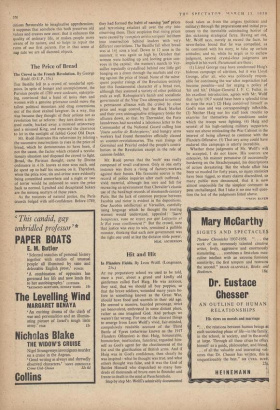Hit and Hit
In Flanders Fields, By Leon Wolff. (Longmans,
25s.) 1
AT my preparatory school we used to be told, once a year, about a grand and kindly old gentleman called Earl Haig. He was anxious, they said, that we should all buy poppies, so that the brave soldiers, wounded many years be- fore in something known as the Great War, should have food and warmth in their old age. He seemed a massive, bearded personage, strict yet benevolent, enthroned in some distant place, rather as one imagined God. And perhaps we weren't far wrong. For one of the clearest things to emerge from Leon Wolff's vivid, fair-minded, compulsively readable account of the Third Battle of Ypres (otherwise known as the 1917 Flanders Offensive) is that Haig, honourable, humourless, inarticulate, fanatical, regarded him- self as God's agent for the chastisement of the foe and the glorification of British arms. And if Haig was in God's confidence, then clearly he was inspired : what he thought was true, and what others thought was false, and it was the God of Battles Himself who dispatched so many hun- dreds of thousands of brave men to flounder and freeze to death in the mud at Passchendaele.
Step by step Mr. Wolff's admirably documented
book takes us from the origins (political and military) through the preparations and initial pro- cesses to the inevitable culminating horror of this sickening strategical farce. Having set out, Mr. Wolff says, merely to record the facts, he nevertheless found that he was compelled, as he continued with his story, to take up certain attitudes; and so, while he urges us to eschew judgment, several crystal-clear judgments are implicit in his work. Paramount are these : (1) Lloyd George may have condemned Haig's hideous campaign of attrition, but it was Lloyd George, after all, who was politically respon- sible for continuing the war after negotiation had become possible—and for urging a policy of 'hit and hit.' (Major-General J. F. C. Fuller, in his excellent introduction, agrees with Mr. Wolff that 'early 1917 would have been a splendid time to stop the war.') (2) Haig conceived himself as God's man and was correspondingly inflexible. (3) Neither Haig nor his staff took trouble to examine for themselves the conditions under which the troops were fighting. (4) Haig and several of his high-ranking military supporters were not above misleading the War Cabinet in the interest of being allowed to continue with the Flanders Offensive. (5) That any army could have endured this campaign is utterly incredible.
Whether these judgments of Mr. Wolff's will be accepted, I do not know. His sources are extensive; his manner persuasive (if occasionally bordering on the Stracheyesque), his descriptions of action devastating. But the whole affair has been so mauled for forty years, so many statistics have been rigged, so many claims discredited, so many public men denounced, that it is now almost impossible for the simplest comment to pass unchallenged. But I take it no one will ques- tion the last of the judgments listed above.
C,MON RAVEN


















































 Previous page
Previous page